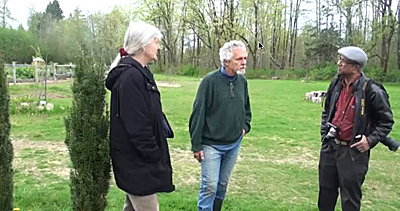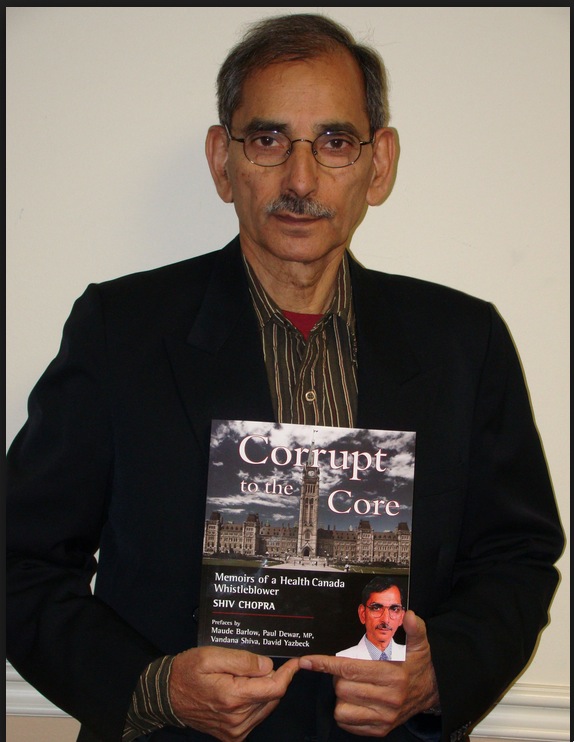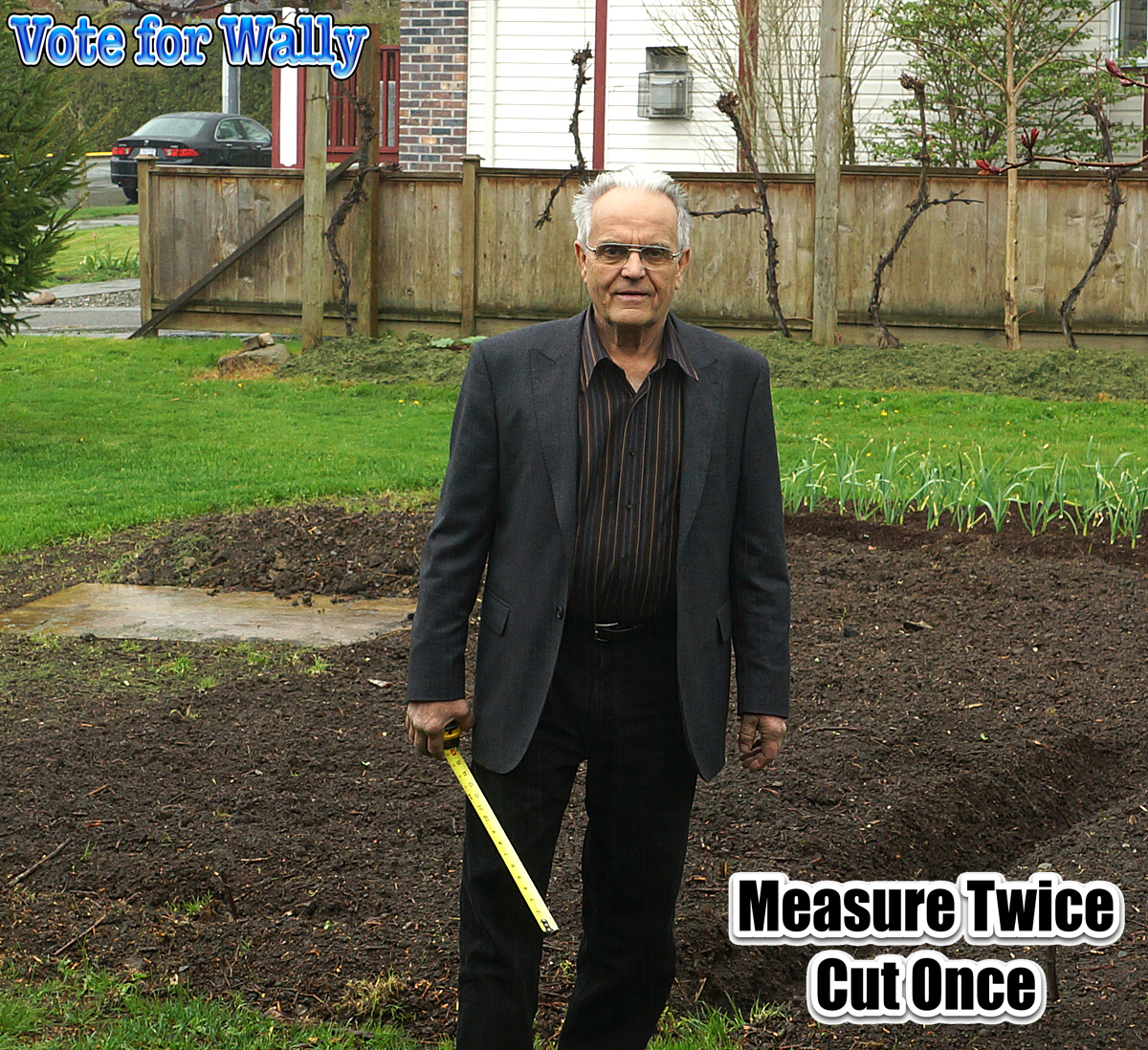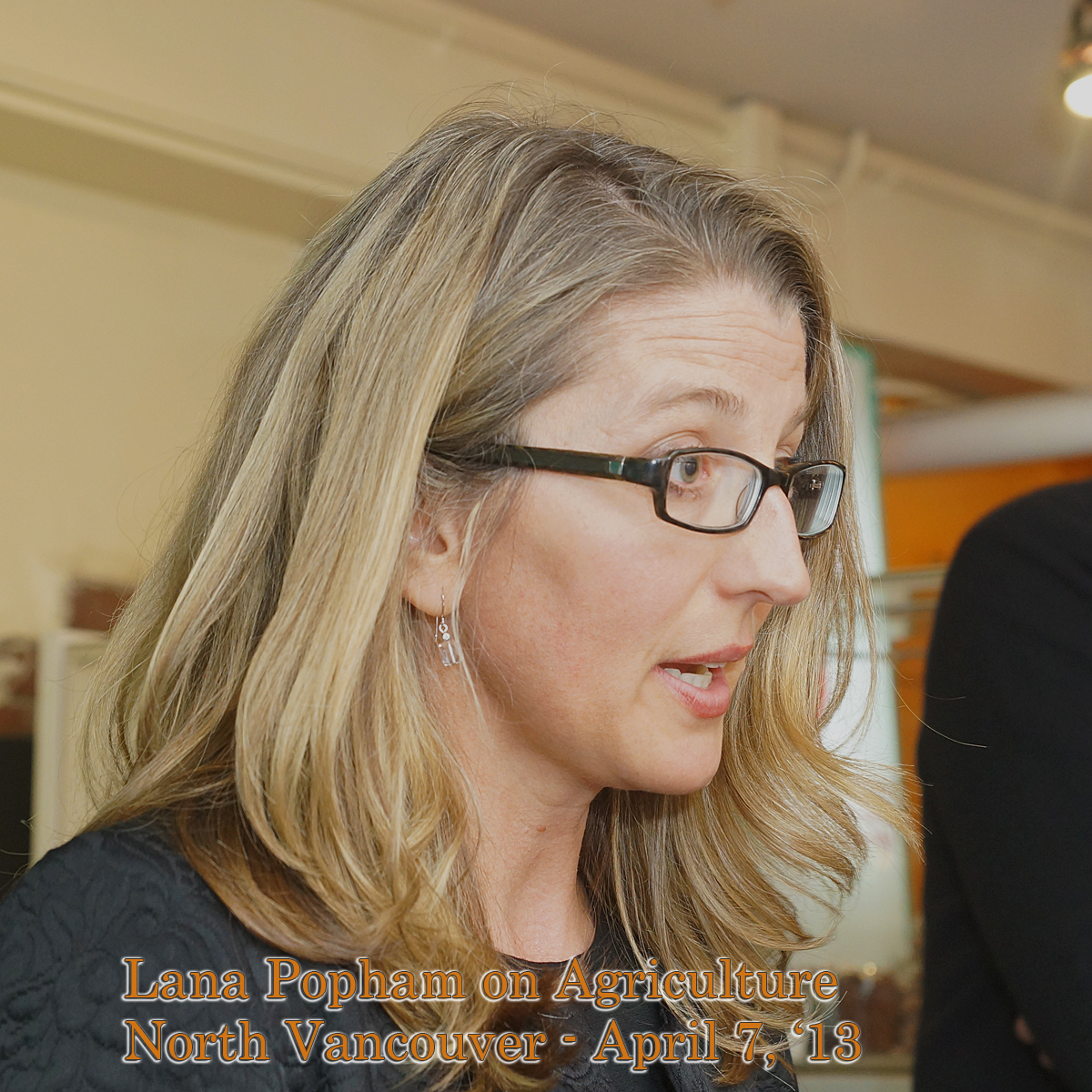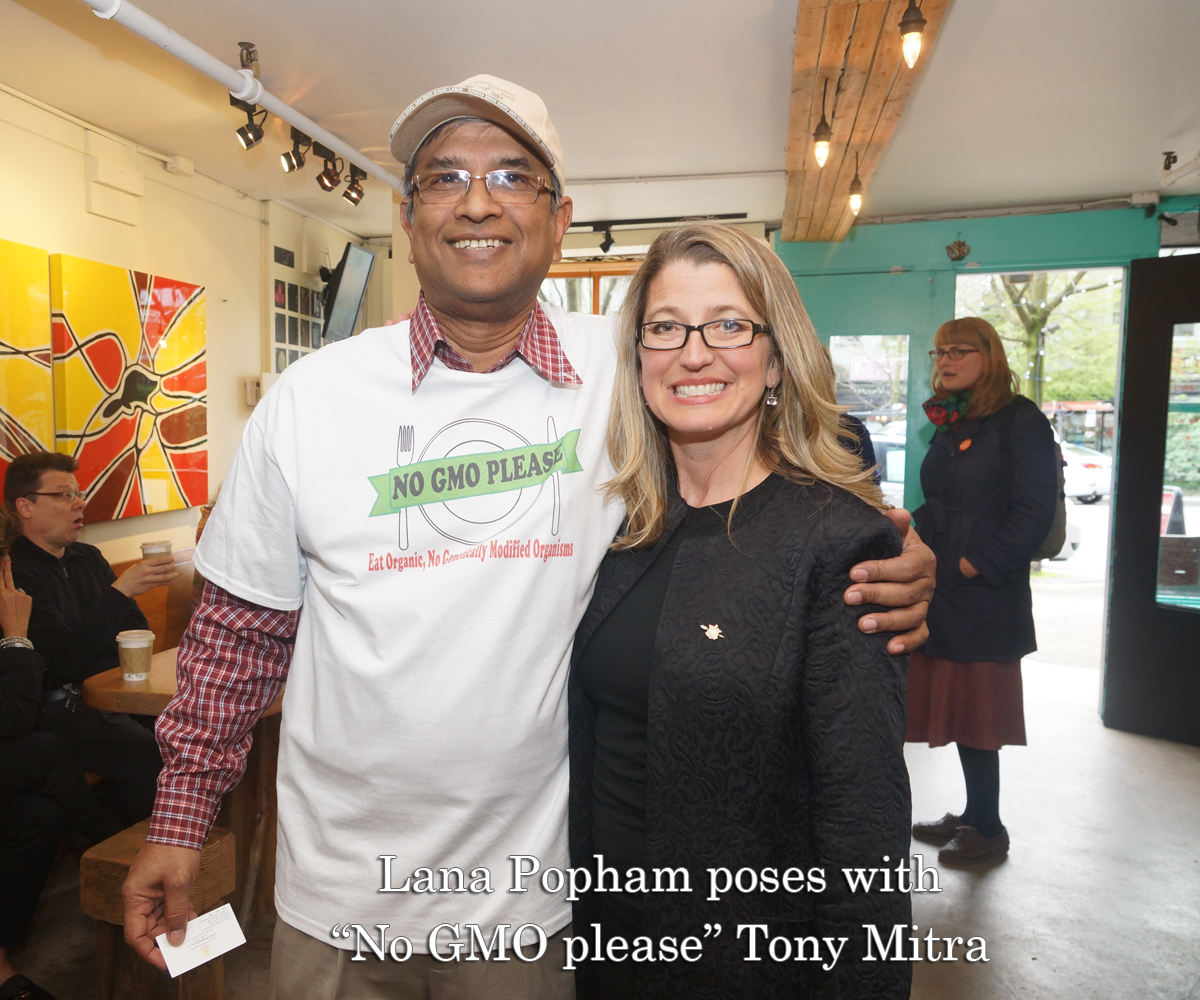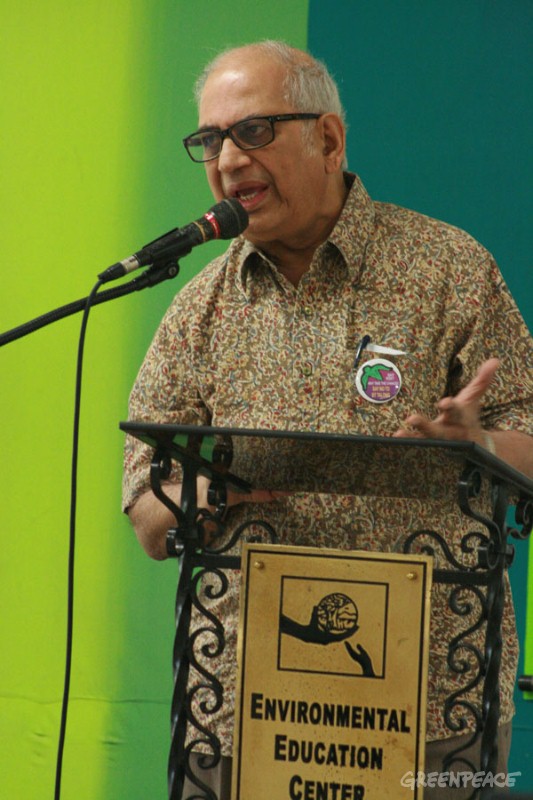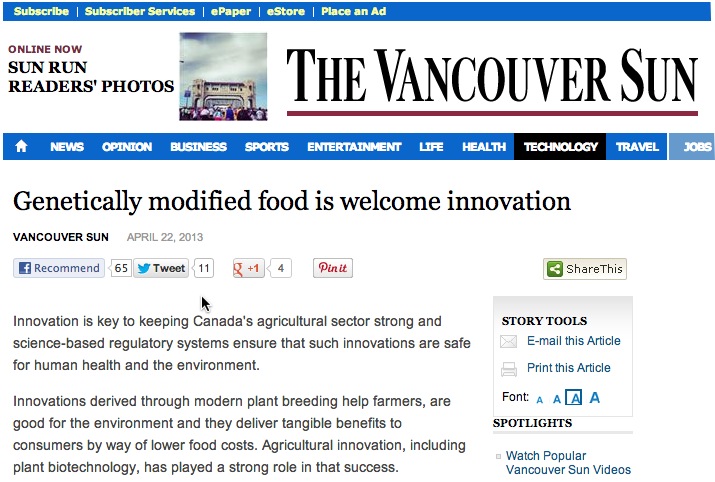
This issue covers letters written to Vancouver Sun rebutting an industry lobby group’s letter to editor that provides misinformation to promote GM seeds. People that wrote the letters read them out for the Podcast, such as Phil Harrison, Bobbie BLair, and myself. You can find it at the bottom of this blog page.
Not a dull moment. A few days ago, I was unaware of the existence of CropLife Canada or its link with GMO. By today, I have seen a dozen people write to the Vancouver Sun, protesting a letter published there on April 22, by the president of CropLife, Lorne Hepworth. I learned that in effect CropLife has financial incentive to see more sale of Monsanto agri-products in Canada.
I came to know if it through emails, linking the web page for the digital version of the paper. Then I found reference to it on Facebook and on Twitter. I finally saw the actual article on a hard copy of the paper at Mr. Tal Lee’s home.
The article promotes GMO for Canada, claims that modern plant breeding technology helps the farmer, is safe for humans and environment and makes food cheaper. It claims farmers across the world are rapidly adopting GM seeds. It also claims millions of farmers in 28 countries are planting biotech crops. It does not substantiate its claims, most of which could be considered as misinformation.
So, in response, a number of folks wrote back to the news paper with their views. I was one of them. We decided not only to write to Vancouver Sun, but to create our own news outlets. This blog is one of them. We shall also read aloud our letters and create audio files for podcasts that will appear in this blog and also on iTunes.
Here is the first response to it, from Ms Bobbie Blair of Langley, BC:
From: Bobbie Blair
Sent: Monday, April 22, 2013 6:00 PM
Subject: CropLife Industry Propaganda… masked as a story?
Hello,
I am a Langley resident who has a busy life, as a mom with a young child who also has a demanding career. However, since last summer, I have taken time that I DON’T ACTUALLY HAVE away from work and family, to try to create awareness in our community about the frightening implications of transgenic (GMO) crops. I came across this story you published today:
http://www.vancouversun.com/technology/Genetically+modified+food+welcome+innovation/8275752/story.html
After learning about GMOs and then doing more research, I was absolutely shocked that our governments were allowing Biotech corporations like Monsanto to not only play with nature (genetic pollution cannot be contained once released into the environment), but to play roulette with our health as well. We are not talking about hybridization, but activities are “invasive to the plant at a cellular level” inserting foreign DNA (animal, human) into plants, and even, as in BT corn and BT cotton, inserting the insecticide into the cells of plants, so that the plant “grows” its own insecticide from the inside out (and then we eat that corn in our processed foods, and eat the meat and dairy from animals fed this stuff… YUMMO!) But Monsanto (the largest Biotech corporation) created DDT, Agent Orange, PCBs and RoudUp, so they are a chemical company looking to control the seed market and the chemical pesticide and herbicides used. In Monsanto’s perfect world, all seeds grown are patented by them, and sprayed with their chemicals worldwide. This is their mission. CropLife works for them, promoting their products. Simple as that.
GMOs are patented seeds that have NEVER been independently tested for safety by either our government, not the US government. On top of this, many farmers have been destroyed by the patented seeds blowing into their fields. (Destroyed financially, emotionally and also literally due to farmer suicides). Biotech corporations have been given the authority, under patent law, to sue a farmer for patent infringement when in fact he does not want their seeds, and their presence in his fields is unwelcome. (Any right- thinking person of average intelligence sees at once that this is not right, and not the way laws normally are written in a great country such as ours). Why is it that the Biotech Industry is allowed to bully farmers, and put their untested (“scientific” studies paid for and conducted by the Biotech industry do NOT count) Franken foods into our food system UNLABELLED? Does any of this sound exaggerated?? I will tell you, I thought a lot of the stuff I came across online had to be exaggerated, as it was so outrageous, so I went to the SFU library, where I found books that supported the horrifying stuff I discovered online. I am not a Genetic Scientist or a professor of Biology or Environmental Studies or anyone with such credentials, but I can put you in touch with such experts, if you wish.
I will tell you, it is EXTREME CONCERN that forces a busy working mom like myself, to take time that I do not have to spare, become an activist and take up a cause. However, I realized that if we do not wake up and take back control of our food, our farmers are going to be reduced to serfs of corporations, and we will lose all choice and access to truly natural and organically grown food. I feel like I am fighting for my daughter’s future, and that we are actually standing at a crossroads right now. It is hurtful and painful for someone like me, when I am trying so hard to expose the truth and spread awareness, to then see a respectable newspaper like the Vancouver Sun allow Crop Life to print pure industry propaganda, to further confuse a society that already lacks important information.
I can only assume that you were not aware of what you were publishing when you ran the above story created by CropLife. Please do an online search on Monsanto, because CropLife works for them, and present the real facts, to set the story straight. As a respected and responsible newspaper, this is the only right thing to do. We rely on local media to be the voice of the people, and a vehicle of truth. I am sure that now that you know, you will set the record straight.
Bobbie Blair
Next, is the letter written by Phil Harrison:
From: PHIL Harrison
Subject: Letter to editor
Date: 22 April, 2013 11:12:50 PM PDT
Dear editor:
I like to respond to the one sided article “Genetically modified food is welcome innovation”. It should be noted that Crop Life Canada represents Monsanto and the other companies making genetically modified organisms, GMOs. The information presented is very much the industry spin.
The article talks about the claims of reduced herbicide use that these products allow. Although this is true for the first few years, over time the weeds develop a resistance to the herbicide. This has forced farmers to spray more and more herbicide for the same result. The resistance now has developed to the point that many weeds are completely immune. Monsanto has addressed this by developing new, more toxic versions of herbicide resistance plants. I think this proves that the reduced pesticide use claim now being made is at best misleading, if not downright dishonest.
Another point I’d like to make is on the safety testing of GMOs. There are no independent studies done on new GMOs being released into the market place. All studies done in North America are done by industry. The company standing to make an immense amount of money on the release of the GMOs can not be trusted to make an honest assessment of their safety. However, Health Canada takes industry’s assurance of safety at face value and approves them. This process does not give me any confidence in the integrity of the process.
I’d like to point out that 65 districts and municipalities in BC have been persuaded of their risks to pass resolutions opposing GMOs being grown in their area.
I hope that the paper will print an article that discusses the many health and environmental risks these products pose.
Phil Harrison
Next is my letter:
From: Tony Mitra
Subject: Genetically modified food is not yet welcome
Date: 23 April, 2013 1:06:56 AM PDT
Re: Letter to the editor dated April 22, 2013 – Genetically modified food is welcome innovation
The article declares opinion and not factual data on benefit of GM food.
Since the technology is primarily poison related, with pesticide in the soil, or toxin in plant DNA, precautionary principle calls for a thorough independent long term analysis of potential harm to health and environment and potential loss of biodiversity.
There is evidence that with the introduction of GM crop, alternative seeds slowly disappear, leaving the patented GM seed as the sole option in a model that promotes mono-culture. This in effect amounts to a loss of biodiversity, and a shrinkage of seed independence and food security of a nation.
The Irish potato famine is a good example where the whole nation was planting only one kind of crop, and when a specialized pest attacked it, it destroyed the entire nations potato and brought on their worst famine in history. There is a danger of that happening with mono-culture regime in any crop.
There is also the issue of food security and if Canadian farmers should lose the ability to choose what variety of crop strain they wish to plant, and only have one kind of patented seed available in the market, controlled by a foreign corporation. This can be taken as a nation losing its food independence.
Finally, the patent holders exert an unprecedented control over lab analysis of their products claiming intellectual property rights. Only with permission of the patent holder can scientific study be done on merit of GM seeds. Even then, the results must be shown to the patent holder before publication and if the result is not flattering, it cannot be published. In short, the patent holder has the veto power to stop any negative report of their product. In a letter published in Scientific American magazine in Aug 2009 the editors write that scientists must ask seed companies for permission before publishing independent research on genetically modified crops, and that this restriction must end. The very fact that analysis is restricted raises doubt about the usefulness of GM food.
There is an increasing body of evidence and data available from outside of North America, such as from Europe and India which raises doubts about Genetically modified seeds.
Further, there is a rise in obesity and other problems of health in the US over the past decade, along with similar increase in average intake of GM food per person. This does not definitively prove a link between GM food and ill-health. However, it indicates a possibility. Therefore, even more rigorous study should be made to check possible negative health effects of GM food.
It is important to remember that it took a hundred years to establish a definite link between smoking and lung cancer. Therefore, with just a decade of use of GM food products, and without serious independent scientific analysis of their effect, one cannot claim that GM crops pose no health risks to mankind.
Therefore, it stands to reason that Canada should consider a moratorium on any GM crop till such time as more definitive scientific analyses can be concluded that prove these crops to be either beneficial or otherwise.
Tony Mitra
And here is a letter written by Dr. Thierry Vrain, rebutting a different but related piece by Robert Wager of Comox Valley (http://www.canada.com/What+really+happened+AVICC+regarding/8280922/story.html). We got the rebuttal from Thierry himself in an email.

Dear Mr Wager,
I retired 10 years ago after a long career as a research scientist for Agriculture Canada. When I was on the payroll I was the designated scientist of my Institute to address public groups and reassure them that genetically engineered crops and foods were safe. I don’t know if I was passionate about it but I was knowledgeable. Like you I took side and I defended the bright side. The side of technological advance, of science and progress.
I have in the last 10 years changed my position. I started paying attention to the flow of published studies coming from Europe, some from prestigious labs and published in prestigious scientific journals, that questioned the impact and safety of engineered food. I was the speaker after you at the AVICC convention in Sooke. Your presentation intended to reassure the audience that genetic engineering is necessary to feed the hungry world of the future, and that the food derived from engineered crops is not different from the non engineered food. I thought it was bold of you to make the sweeping statement during the question period that all I had said was pseudo-science. You appear to be a passionate man, emotional and knowledgeable about your topic. And very dedicated to reassure the public in your opinion letters to the Globe and Mail and other newspapers.
In my presentation following yours I refuted each of the claims of the biotechnology companies that their engineered crops yield more, that they require less pesticide applications, that they have no impact on the environment and of course that they are safe to eat. My presentation was basically a review of over 100 separate published studies. There is a good number of scientific studies that have been done for Monsanto by Universities in the USA, Canada, and abroad. Most of these studies are concerned with the field performance of the engineered crops, and of course they find GMOs safe for the environment and therefore safe to eat. There is however an overwhelming and growing body of scientific research done mostly in Europe, Russia, and other countries, showing that diets containing engineered corn or soya cause serious health problems in laboratory mice and rats. Mice and rats are the canary in the mine. We use them to test the safety of a lot of pharmaceuticals and other chemicals. We should all take these studies seriously and demand that the government agencies replicate them rather than rely on studies paid for by the biotech companies.
The Bt corn and soya plants that are now everywhere in our environment, are registered as insecticides. But are these insecticidal plants regulated and have their proteins been tested for safety? Not by the federal departments in charge of food safety, not in Canada and not in the USA. There are no long term feeding studies performed in these countries to demonstrate the claims that engineered corn and soya are safe. All we have are scientific studies out of Europe and Russia, showing that rats fed engineered food die prematurely, with breast cancer, and kidney and liver damage. All these studies are compiled and referenced in a report published last June called GMO Myths and Truths – available for free at Earth Open Source.
These studies show that proteins produced by engineered plants are different than what they should be. Inserting a gene in a genome using this technology can and does result in damaged proteins. The scientific literature is full of studies showing that engineered corn and soya contain toxic or allergenic proteins.
Genetic engineering is 40 years old. It is based on the naïve understanding of the genome based on the One Gene – one Protein hypothesis of 70 years ago, that each gene codes for a single protein. The Human Genome project completed in 2002 showed that this hypothesis is wrong. The whole paradigm of the genetic engineering technology is based on a misunderstanding, and ignoring of the new knowledge. Every scientist now learns that any gene can give more than one protein and that inserting a gene anywhere in a plant eventually creates rogue proteins. Some of these proteins are obviously allergenic or toxic.
It appears that many people in the Comox Valley are concerned enough. Our latest local poll in the CV Echo was 95% of people in this valley want labeling or an outright ban of engineered product. This is our local reality, I cannot speak for the rest of Vancouver Island but I suspect that the AVICC delegates voted “what their constituents want”.
Thank you for your consideration Mr Wager, I don’t suppose that we will ever reconcile our positions. For my part I will keep pushing and writing to alert the public and government agencies until the safety studies are initiated. I assume that you will keep your reassuring stance as well.
Respecfully,
Dr. Thierry Vrain
Next letter is from Brandie Nadiger-Harrop, which is expected to be published in Vancouver sun by Friday, April 26th.
My take on the GMO food in our food system
Recent stories, studies and suggestions have been surfacing regarding genetically modified organisms, and the confusion out there has inspired me to write what I have learned over the years in my own research on the subject.
There are no government agencies anywhere doing long-term testing on the safety of genetically engineered (or GMO) crops. Nearly all studies on the subject are funded and supported by the biotechnology industry and it’s peers. The USA called the engineered products “substantially equivalent” to their conventional counterparts, and that has been used, unquestioningly and blindly, as a scientific truth with zero independent research supporting the phrase.
GMOs are NOT good for the environment. Cross contamination with conventional and organic crops destroys any options for people who do not want to consume GMO & for food companies that don’t want to use them. The diversity of our food supply is dwindling due to GMOs as older varieties fade away in the world of the monocultured GM fields and as contamination spreads. There is also the fact that since the excessive growing of GM crops, the bees and butterflies are dying. We need our pollinators for food, we MUST look into this! Herbicide being sprayed directly onto GM Roundup Ready crops is now being found in the air we breathe, the water we drink and in our food. The government’s answer to this? Raise the acceptable level of what the food contains! That is looking out for our health and well being?
Recent tests also show that the natural microbial balance in our soil is dying off, affecting worms and all aspects of our croplands. We are effectively killing our growing medium with these products! That is good for us or our environment? In David Suzuki’s documentary, the Silent Forest, he talks about how the toxins living inside the plant leach into the ground and eventually into our water.
Biotech industries would have you believe that farmers are embracing GMOs but I beg to differ. The farmers at my farmer’s market have all lobbied the government in protest to no avail. If the farmers are embracing them, then why is the National Farmer’s Union doing mass protests like the Canada-wide Day of Action on April 9th to protest GMO alfalfa? That doesn’t really sound much like “embracing” to me.
There are new studies coming out every week on the potential risks of GMOs, but no one seems to be listening. A long term study in France came out at the end of last year proving that GMO’s and glyphosate cause tumours, cancer and infertility. Take a look at the human cancer numbers before genetic engineering, and after it infiltrated 80% of out processed foods. It doesn’t take a rocket scientist to see that something is dreadfully wrong with our food supply. Lack of labeling has made it impossible to directly tie GM ingredients to disease, and that is a wise angle the biotech companies spend millions on to defend.
Biotech companies would have the public believe that protesters are few and using old data to create fear mongering, that the majority of the public and farmers want this. If most are for this, why is Canada starting to protest? Canadians almost never protest. How are we able to organize country-wide protests and having good turnouts at every rally all across Canada, with the farmers AND the consumer? If the world really loves this then why are they banned or labeled in 61 countries?? Probably not because they think GMOs are safe. Also, if the world is “embracing GMOs”, why is there a worldwide protest happening on May 25th? 252 cities in 37 countries on 7 continents?? It is going to be the largest world protest ever seen. That once again doesn’t sound like the world embracing GMO, it sounds like the world is embracing their right to NOT have GMOs on their plates or in their countries.
The biotech industry would love for the public to believe that anti-GMO supporters are a few crazy people belonging to special interest groups that are more concerned with fundraising than with health concerns. The people of many groups such as GMO Free Canada and Millions Against Monsanto all donate their time and efforts, using money out of their own pockets to fund their printing and travel. The organic industry pays with their own money to defend their livelihood from GMO contamination.
BC now has 16 GMO free zones and Vancouver Island is now fighting to become a GMO free zone. That’s a lot more than just a select few crazy misinformed people…THAT is the GENERAL PUBLIC!
sincerely Brandie Harrop
member of the board GMO Free Canada
PODCAST
We are trying to get folks that wrote the letter to read them out in their own voice, to prepare an audio podcast of it. So far we have only a few letters covered. But we expect the podcast to get longer as more contribute. You can find the podcast at the bottom of this page.
 Here we include a podcast involving a talk with Dr. Ramu of India, on sustainable agriculture.
Here we include a podcast involving a talk with Dr. Ramu of India, on sustainable agriculture.


